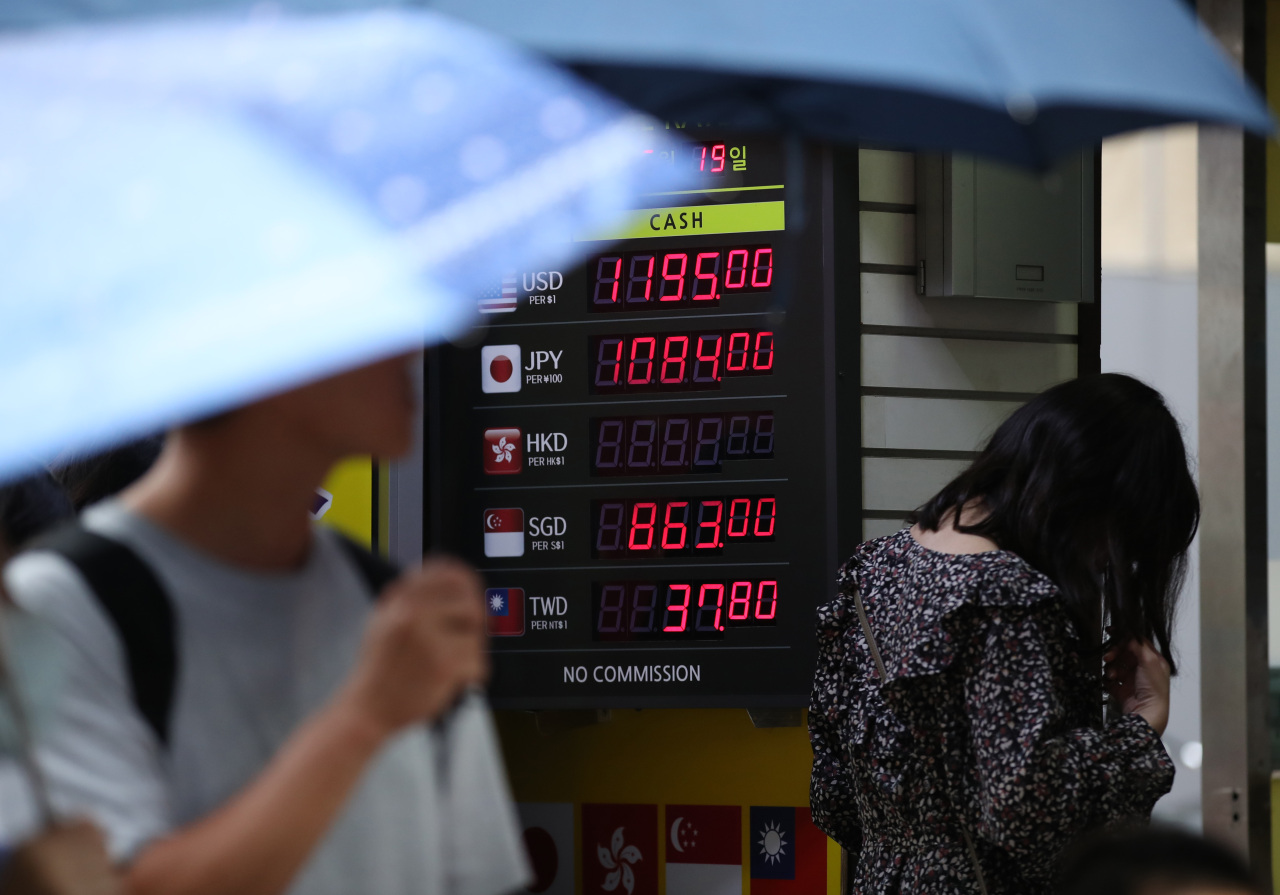US-China trade dispute weighs on Korea’s financial markets
By Jung Min-kyungPublished : May 19, 2019 - 14:58
The value of South Korean won compared to other major currencies fell to a 19-month low as of Sunday, with the ongoing US-China trade disputes weighing down the economy.
Asia’s fourth-largest economy also saw its benchmark Kospi shed 7 percent after US President Donald Trump’s announcement to impose fresh tariffs on Chinese goods, two weeks earlier.
According to real effective exchange rate index compiled by the Bank for International Settlements, the value of the South Korean currency declined 0.6 percent on-month to 110.2 points.
This was the lowest level since September 2017, when the rate stood at 109.64.
Asia’s fourth-largest economy also saw its benchmark Kospi shed 7 percent after US President Donald Trump’s announcement to impose fresh tariffs on Chinese goods, two weeks earlier.
According to real effective exchange rate index compiled by the Bank for International Settlements, the value of the South Korean currency declined 0.6 percent on-month to 110.2 points.
This was the lowest level since September 2017, when the rate stood at 109.64.

REER is a summary index that tracks a currency’s exchange rate against a basket of other currencies, and is used to measure the effect of foreign exchange fluctuations, which have a an impact on exports.
A reading above 100 means the country’s exchange rate is overvalued compared to the base year of 2010, while numbers falling below the mark shows it is undervalued. BIS compared 61 major currencies to calculate the latest index.
The won closed at 1,195.7 against the US dollar on Friday, rising 5.4 percent on-month and losing ground against the greenback.
Analysts projected the Korean won to rise above the 1,200-level this week, while citing growing uncertainty from the US-China trade war coupled with Korea’s drop in exports. The nation’s exports fell 2 percent in April on-year, while continuing to decline for the fifth consecutive month.
“The won-dollar exchange rate is projected to exceed the 1,200-level considering the projections surrounding Korea’s current account balance and economic performance for the second-half of the year,” Park Jung-woo, a researcher at Korea Investment & Securities said.
The rate is expected to stabilize to the range of 1,100 to 1,150 once the uncertainty from the US-China trade dispute is lifted, Park added.
Meanwhile, the trade row has been looming over the nation’s stock market for weeks now, with the benchmark Kospi closing down 7.09 percent from May 3, at 2,055.8 on Friday. May 3 marked the last trading session before Trump threatened via Twitter to raise tariffs on $200 billion worth of Chinese goods to 25 percent from the previous 10 percent. The remark took shape and went into effect on May 10.
Among the listed firms, those in the technology sector was hit hardest with an average decline of 10.25 percent. Carmakers and insurance firms followed in order, with a 9.63 percent and 8.94 percent drop, respectively.
“Emerging stock and bond markets have registered the largest capital outflow since the impact of President Trump’s previous decision to impose tariffs against China in June last year,” Jun Gyun, a senior analyst at Samsung Securities said in a Friday note.
Overseas investors net sold nearly 1.7 trillion won ($1.5 billion) worth of Kospi shares from May 9 to Friday.
By Jung Min-kyung (mkjung@heraldcorp.com)







![[Graphic News] More Koreans say they plan long-distance trips this year](http://res.heraldm.com/phpwas/restmb_idxmake.php?idx=644&simg=/content/image/2024/04/17/20240417050828_0.gif&u=)
![[KH Explains] Hyundai's full hybrid edge to pay off amid slow transition to pure EVs](http://res.heraldm.com/phpwas/restmb_idxmake.php?idx=644&simg=/content/image/2024/04/18/20240418050645_0.jpg&u=20240419100350)






![[From the Scene] Monks, Buddhists hail return of remains of Buddhas](http://res.heraldm.com/phpwas/restmb_idxmake.php?idx=652&simg=/content/image/2024/04/19/20240419050617_0.jpg&u=20240419175937)

![[KH Explains] Hyundai's full hybrid edge to pay off amid slow transition to pure EVs](http://res.heraldm.com/phpwas/restmb_idxmake.php?idx=652&simg=/content/image/2024/04/18/20240418050645_0.jpg&u=20240419100350)

![[Today’s K-pop] Illit drops debut single remix](http://res.heraldm.com/phpwas/restmb_idxmake.php?idx=642&simg=/content/image/2024/04/19/20240419050612_0.jpg&u=)